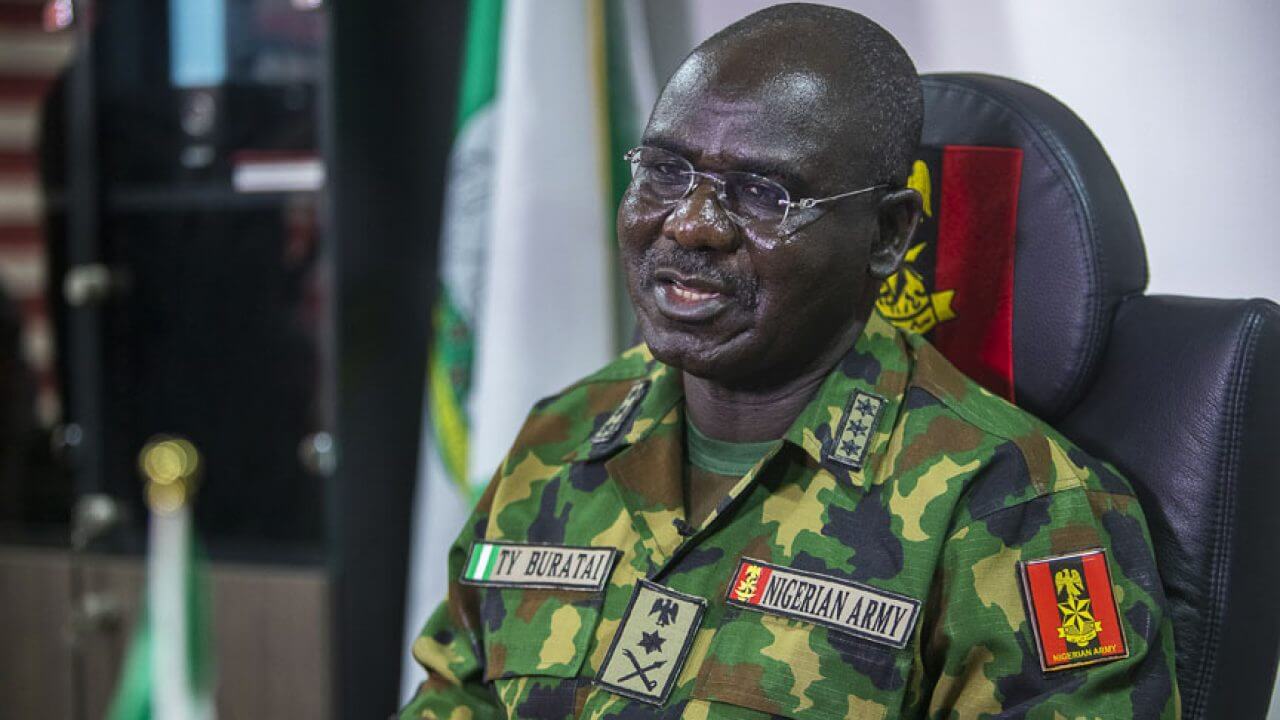Following the brutal murder of more than 110 farmers by Boko Haram militants in the Zabarari village this past weekend, there has been a renewed focus on terrorism in Nigeria. Commenting on the damage wrought by Islamist insurgencies that have killed tens of thousands and displaced millions over the past decade, Chief of Army Staff, Lt Gen Tukur Yusuf Buratai, admitted that “there is [a] likelihood of terrorism persisting in Nigeria for another 20 years”.
President Muhammadu Buhari has said that the “entire country has been wounded by these senseless killings”, while lawmakers have summoned the leader to discuss a solution to the mounting crisis of terrorist insurgencies in the country. Likewise, the army chief said that there must be an “appropriate response” by civil and military authorities, while also calling for international support and “citizen responsibility”.
In fact, Nigeria ranks third on the global terrorism index, despite the number of terrorism-related deaths falling by 39.1% from 2018 to 2019. Nevertheless, this does not take into account incidents in 2020, which at first glance may point to an escalation in hostilities. Just in September, Boko Haram militants killed 22 farmers near Maiduguri in two separate incidents. Similarly, in January, the group assassinated Reverend Lawan Andimi, who was the chairman of the Christian Association of Nigeria (CAN), after taking him hostage and trying to force the government to negotiate.
Borno state is one of the most unstable regions in the country; in March, 70 soldiers were killed in an ambush by armed jihadist militants near the Gorgi village. Other notable incidents in the state include the ambush of six soldiers last month, and a bomb blast that killed over 30 people in January.
Aside from Boko Haram, the country is also populated by groups affiliated with the Islamic State (IS) and offshoots of the Boko Haram, such as the Islamic State West Africa Province (ISWAP).
This decade-long conflict left well over 36,000 people dead and displaced 1.8 million in northeastern Nigeria. Despite this, both the military and the government have claimed victory over the Boko Haram multiple occasions —in 2015, 2016, 2017, 2018, and 2019.
The continued instability is on some level a reflection of religious divisions in the country. Nigeria is roughly evenly split between Muslims and Christians, with Muslims largely living in the north, and Christians largely living in the south. Last year, nearly 1500 Christians were killed in the north. This, however, is a simplistic deduction, as people of all faiths have been affected by this constant state of conflict.
The Institute for Security Studies’ Malik Samuel argues that this instability can more heavily be attributed to the military’s decision to “pull soldiers out of villages” last year. In doing so, they abandoned their scattered, small unit formations, and congregated in “bigger, stronger, and better-equipped camps”, in what has been referred to as the ‘super camp strategy’. However, while this approach was intended to bolster the military’s resolve and protect against Boko Haram attacks on army bases, it eroded its ability to effectively protect civilians, as soldiers are now concentrated at specific checkpoints, rather than spread out across the country. Samuel notes, “Super camps are typically located away from civilian settlements, hampering the quick reaction capacity of the military when attacks on civilians occur.”
Furthermore, although Nigeria ranks second only to South Africa in terms of military expenditures in the continent, there are allegations of corruption amongst “military personnel, politicians and other public officers”, and a lack of transparency in the transfer of funds. This is complemented by “weak monitoring, controls and audits of the military budget, which allowed corruption and waste to get through”.
Against this backdrop of willful ignorance and brazen corruption by the government and the military, it is unfortunately likely that Lt Gen Tukur Yusuf Buratai’s assessment of continued instability will hold true.
Amid Repeated Islamist Attacks, Nigerian Army Chief Says Terrorism Could Last for Decades
The ominous statement by Tukur Yusuf Buratai comes on the back of the murder of over 100 farmers by Boko Haram militants.
December 4, 2020

Nigerian Chief of Army Staff Lt Gen Tukur Yusuf Buratai SOURCE: GLOBAL TIMES NIGERIA
